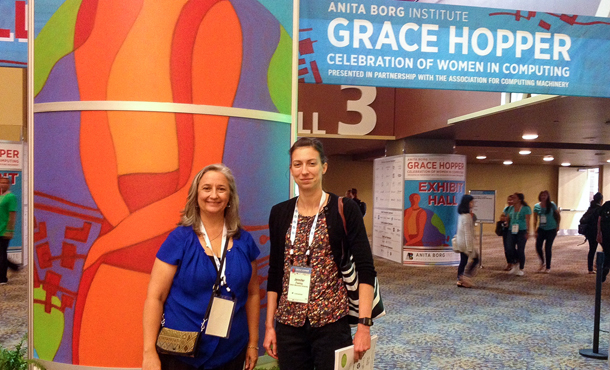In the male-dominated field of computer science, Dee Weikle is used to being in the minority. The associate professor of computer science at Eastern Mennonite University can name all of her female students majoring in the field on the fingers of one hand.
One of those students, among the approximately 18 percent of women who will earn a computer and information science degree in the United States, is Jennifer Fawley, in the process of earning her second bachelor’s from EMU (her first is in environmental sustainability).
If Fawley had any doubts about joining that minority, a recent weekend at the Grace Hopper Celebration of Women in Computing in Phoenix, Arizona, dispelled them.
“I am really enjoying the coursework and look forward to future possibilities,” she said. “It’s a really exciting field to be in right now.”
“The tide is changing slowly,” Weikle said, of a growing number of women in science, technology, engineering and math (STEM) fields. “But Grace Hopper is special. Just that concept that there are 7,500 other women doing computer science and they’re all there in one place is amazing.”
Fawley, too, found it “energizing to be around other women” in the field. With Weikle’s encouragement, she had applied for and was named a Grace Hopper Scholar. The award covered all travel expenses and waived her registration fees.
At the convention, Fawley chose from a variety of sessions, workshops, and networking opportunities, from her particular interest of cybersecurity to data science, programming languages, cloud computing, wearable computing, hacking for social justice, and plenary sessions with technology executives from companies such as Google, Microsoft, Symantec, and Mozilla.
“I was able to find out what other women in the field liked and what they struggled with as well,” Fawley said. “It’s a good chance to learn more about technical fields in computer science that I haven’t necessarily been exposed to yet.”
EMU professor attended first conference
The conference, which celebrated its 20th anniversary this year, is named for the renowned computer scientist and United States Navy rear admiral. Grace Hopper was one of the first women to earn a doctorate in mathematics in the United States and went on to make significant contributions to computer development, programming languages and data processing. In 1969, Hopper was awarded – ironically – the inaugural Computer Sciences Man of the Year award from the Data Processing Management Association.
That same year, 20-year-old Anita Borg began her first processing job. Borg would emerge as one of the foremost promoters of women in technology. The Anita Borg Institute of Technology partners with the largest international society devoted to the field, the Association for Computing Machinery, to host the Grace Hopper Celebration.
Weikle attended the first Grace Hopper Celebration in 1994, when it was “small and intimate,” she says, with only around 500 attendees. Men have always been encouraged to attend – then and now (in conference parlance, these attendees are called “male allies”). During that first conference, her husband took care of their infant son while Weikle, a doctoral student at University of Virginia, presented a paper. In the audience that night was rising star Maria Klawe, then head of the computer science department at University of British Columbia. She later held baby Ricky at a banquet, a memory that still makes Weikle smile. Now president of Harvey Mudd College, Klawe was listed No. 17 on Fortune’s list of world leaders.
The conference attracts both academicians and tech executives, and often, like Klawe, those with connections to both worlds. Keynote speakers at the 2014 convention included the studio head of the Halo franchise, a lab director at EBay Research Labs, a founding member of Google, and the chief data scientist for Barack Obama’s 2012 campaign.
‘Great time’ for women in computing
Weikle says conferences like Grace Hopper help women see that choosing a STEM-related profession doesn’t require them to change who they are. Nor are women in the field stereotypically “nerdy,” serious, and incapable of completing domestic tasks.
“I’ve often had people ask me, ‘Do female engineers cook?’” she said. “And I say, ‘Some do and some don’t.’ I ask them, ‘Do male engineers cook?’ Some do and some don’t. Technical people are in fact just other people, and Grace Hopper does that for the women who go, and also for the men who go, because there are a lot of men who struggle with some similar stereotypes.”
Grace Hopper also celebrates successful women in a profession that is meeting new needs and creating new applications across the world. This is a message that Weikle especially wants to share with prospective computer science majors and minors, as well as re-entry students.
“There’s a big push in the industry to get women into these jobs,” Weikle said, “and very favorable hiring conditions.”
Computer science is one of the fastest growing fields in the United States, with 1.4 million new jobs expected to open by 2020, according to the U.S. Department of Labor. And because of the speed at which the field is changing, Weikle says it’s one of the most accessible to the recent graduate or the retooling job hunter.
“Right now is a wonderful time for women in this profession,” Weikle said. “The field is changing so fast. If you’ve been on the job market for a while, it’s OK, because, guess what? Everybody has to learn new things in this field. Being at a conference like this helps women imagine doing that and accomplishing that and not feeling like they need to be different to do that. They can still be who they are and do this work, and that is a wonderful vision.”
